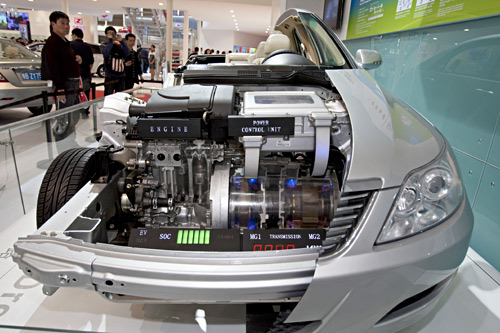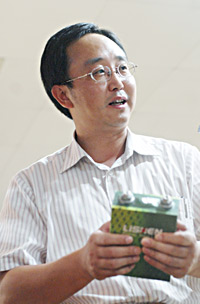|
 |
|
POWERING UP: China's lithium-ion battery industry is gaining momentum from the development of electric cars (CFP) |
Only 10 years ago, the lithium ion battery was limited to the lab experiments of pioneering scientists. Today, the innovative cell is fast becoming the driving force to power the next generation of technology.
After years of toiling, the first home-made commercially viable lithium battery pack was created in 1997 in a research lab of the Tianjin Institute of Power Sources. Breaking through the strong defensive line of its Japanese competitors, the innovative battery marked the country's very first step into the unchartered territory of lithium power.
The technological breakthrough gave many Chinese companies a foot in the lithium-production door. But as the industry maneuvers onto a faster and more productive track, a wide divide is opening from within.
Top players, like Shenzhen-based BYD and BAK Battery Co. Ltd., are underpinning their global foothold on the back of improving safety conditions and battery reliability.
The emerging industry, however, is still in its infancy, standing on wobbly legs. A number of smaller manufacturers, eager to jump on the lithium bonanza, are flooding the market with slipshod, low-capacity batteries for cell phones and MP3 players. The cheap labor and vibrant demands have delivered quick windfalls, but the lack of technological know-how and operational expertise has cast an ominous shadow over their long-term prospect. While fire-related accidents and explosions have been rare, occasional recalls have served as a reminder that the industry still needs time to develop.
"Ever since its start-up, the sector has been feeling the pain of reckless quality control," said Huang Xuejie, a senior researcher with the Chinese Academy of Sciences, in a report. "Now product safety has gained such importance that it may be a deciding factor by which many smaller battery makers would survive or perish."
Richard Liang, Vice President of the Tianjin Lishen Battery Joint Stock Co. Ltd., agreed. "Without proper quality safeguards in place, our promise to be a top brand would look more of a distant hope," he told Beijing Review.
 |
|
LEADING THE WAY: Richard Liang, Vice President of Tianjin Lishen Battery Joint Stock Co. Ltd., a key player in the manufacturing of lithium-ion batteries, talks about the future of the product (WEI YAO) |
The miracle of Lishen is a vivid microcosm of the country's decade-long trajectory with the rechargeable battery business. Twelve years ago when the state-owned battery maker was founded, it was widely expected to be a market hit. But few expected it to take off so soon--Lishen is currently the world's sixth largest lithium ion battery producer and partner supplier of global electronics giants including Samsung and Motorola.
Effective branding and marketing added luster to the corporate performance, and most importantly the vigorous efforts in safety improvement are paying off, said Liang.
"We did our best to deliver quality assurance throughout all stages of the battery-making process, from product structure design to protective functions," said Liang. "In addition, we scoured the globe for the most advanced materials of electrodes, anodes, separators and electrolytes."
Special casings, for instance, protect the lithium ion inside the batteries in case of high-speed collisions and the lithium ion could also be combined with other substances to reduce the risks, Liang said.
Catching up
From mobile phones and video cameras to laptops and cars, lithium ion batteries are quickly finding their way into households, garages and everyday use. The power source of the future is small enough to fit into the palm of your hand.
| 